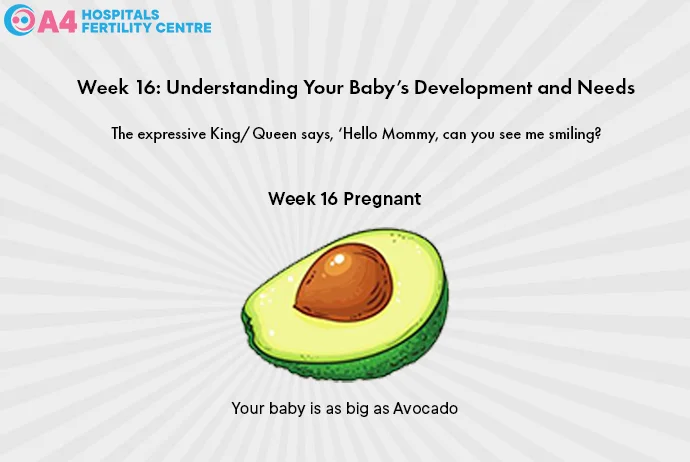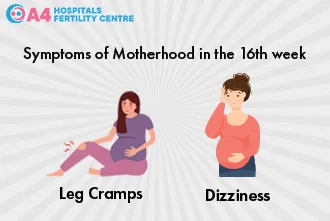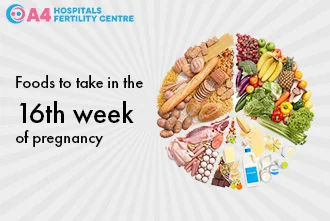
Dr. Aruna Ashok MBBS, MS OG, DNB OG
- Clinical Director

This is a fascinating time as your baby, often referred to as the “king” or “queen” of your womb, starts expressing more noticeable signs of life. Imagine your little one saying, "Hello Mommy, can you see me smiling?" It’s a heartwarming thought, isn’t it?
At 16 weeks, your baby is growing rapidly. The fetus now measures about 4.6 inches and weighs around 3.5 ounces. This is the week when your baby might start making facial expressions, although they’re just practice movements at this stage. These expressions could be smiles, frowns, or even grimaces, as your baby’s facial muscles develop.
Your baby’s eyes are moving slowly from the sides of the head to the front, and ears are almost in their final position. While you can’t feel it yet, your baby is also starting to move its limbs more actively. Imagine those tiny hands and feet wriggling around, preparing for the busy life outside the womb!
This week is also significant for the development of the baby’s circulatory and urinary systems. The heart pupms about 25 quarts of blood each day, a number that will continue to grow as your baby develops. Your baby’s urinary system is also working, with the kidneys filtering blood and producing urine that is released into the amniotic fluid.
One of the most exciting aspects of week 16 is the potential to determine your baby’s gender. If you have an ultrasound scan this week, you might catch a glimpse of whether you’re expecting a boy or a girl. It’s a thrilling thought, adding another layer of connection between you and your baby.
Now, let’s make this interactive. Picture yourself in a quiet moment, maybe in the evening, as you gently touch your belly and say, “Hello baby, can you hear me?” It’s a wonderful way to start bonding with your little one, even before you meet face-to-face.
As you navigate through this beautiful journey, remember to cherish these moments. Every smile, every kick, every heartbeat is a step closer to meeting your baby. A4 Fertility Centre offers Birthing classes that provide valuable insights and support to help you and your baby thrive. These classes are designed to prepare you for the upcoming stages of pregnancy and motherhood, ensuring you have all the knowledge and confidence you need.


Reaching the 16th week of pregnancy comes with a unique set of experiences. As your baby grows, so does the range of symptoms you might encounter. Understanding these can help you manage them better and enjoy your pregnancy journey.
One of the most noticeable symptoms is an increase in energy levels. Many women find that the fatigue of the first trimester begins to fade, leaving them feeling more vibrant and active. This is often a welcome change, allowing you to resume some of your normal activities with less exhaustion.
Your body is undergoing significant changes. This is mainly to accommodate your growing baby. You might notice your belly starting to show more prominently. This “baby bump” can be a source of joy and excitement, as it makes your pregnancy feel more real. Embrace this change and wear it with pride!
Another common symptom is an increase in appetite. Your body needs extra nutrients to support your baby’s development, and you might find yourself feeling hungrier than usual. It’s essential to focus on nutritious foods that will benefit both you and your baby.
You might also experience some discomforts, such as backaches or round ligament pain. These are due to the stretching of muscles and ligaments to make room for your growing uterus. Gentle exercises, like prenatal yoga or stretching, can help alleviate these aches. Remember to listen to your body and rest when needed.
Some women notice changes in their skin, such as the “pregnancy glow” or darkening of certain areas, like the nipples or a line down the abdomen called the linea nigra. These changes are due to hormonal shifts. Moreover, they are usually temporary. Keep your skin moisturized. Also, have it protected from the sun to maintain its health.
You may also experience nasal congestion or nosebleeds. This happens because of the increased blood volume and hormonal changes affecting your nasal passages. Use a humidifier and stay hydrated. These can help manage these symptoms.
Lastly, emotional changes are a significant part of pregnancy. You might feel a range of emotions from sheer excitement and joy to anxiety and mood swings. It’s essential to acknowledge these feelings and talk about them with your partner, family, or a counselor if needed. Emotional health is one of the most crucial aspects for a healthy pregnancy.
To make this more engaging, take a moment each day to jot down how you’re feeling. Create a journal of your pregnancy journey, noting the changes in your body and emotions. This can be a wonderful keepsake and a way to track your progress.
A4 Fertility Centre’s Birthing classes can offer you additional support. These classes touch upon a wide range of topics. This includes managing pregnancy symptoms, and provide a community of expecting mothers to share experiences and tips.
Nutrition plays a pivotal role in the 16th week of pregnancy. Your growing baby will be in need of a variety of nutrients to develop healthily, and maintaining a balanced diet is key to ensuring both you and your baby get what you need.
Start with incorporating plenty of fruits and vegetables into your diet. These provide essential vitamins, minerals, and fiber. Aim for a colorful plate to ensure a wide range of nutrients. Think of adding spinach, carrots, bell peppers, and berries to your meals. These are packed with vitamins A and C, which support your baby’s growth and boost your immune system.
Whole grains are another important component of your diet. Foods including quinoa, brown rice, and whole wheat bread are good choices. Because they are rich in fiber and B vitamins, which are crucial for your baby’s brain development. These also help keep your digestive system regular, reducing the risk of constipation, a common pregnancy complaint.
Protein is vital for the growth of your baby’s tissues and organs. Include a variety of protein sources. Make sure this and plan your diet accordingly. Common protein sources such as lean meats, poultry, fish, beans, nuts, and seeds can help. Fish like salmon are particularly beneficial as they contain omega-3 fatty acids, which support your baby’s brain and eye development. Make sure to avoid high-mercury fish like swordfish and king mackerel.
Dairy products should also be a staple in your diet. They are excellent sources of calcium, which is necessary for the development of your baby’s bones and teeth. Aim for three servings of dairy each day, including options like milk, yogurt, and cheese. If you’re lactose intolerant, look for fortified plant-based alternatives like almond milk or soy yogurt.
Iron is another critical nutrient at this stage. It supports the increase in blood volume and helps prevent anemia. Incorporate iron-rich foods like lean meats, spinach, lentils, and fortified cereals. Pairing these with vitamin C-rich foods can enhance iron absorption, so consider having a glass of orange juice with your meals.
Hydration is equally important. Drink plenty of water throughout the day to stay hydrated. It helps maintain your amniotic fluid levels and supports your increased blood volume. Aim for at least 8-10 glasses of water daily. Herbal teas and fruit-infused water can add variety to your hydration routine.
To make this interactive, try creating a weekly meal plan. List out nutritious meals and snacks that you enjoy and fit into your routine. Share your meal ideas with other expecting mothers in A4 Fertility Centre’s Birthing classes for inspiration and support.
These Birthing classes also provide detailed nutritional guidance to help you make informed choices about your diet. They emphasize the importance of a balanced diet and offer tips to manage cravings and aversions, ensuring you and your baby get the best nutrition possible.
Counseling can be incredibly beneficial during the 16th week of pregnancy. It provides support, information, and reassurance, helping you navigate the physical and emotional changes you’re experiencing.
One important aspect of counseling is emotional support. Pregnancy can bring a range of emotions, from joy and excitement to anxiety and mood swings. Counseling offers a safe space to discuss these feelings and learn coping strategies. It can help you manage stress, improve your emotional well-being, and prepare for the changes ahead.
Counseling also provides valuable information about pregnancy, childbirth, and parenting. This knowledge can empower you to make informed decisions and feel more confident in your journey. Understanding what to expect can reduce anxiety and help you focus on the positive aspects of pregnancy.
Many counseling sessions include discussions about healthy lifestyle choices. This can cover topics such as nutrition, exercise, and avoiding harmful substances. Counselors can provide personalized advice to ensure you’re taking the best possible care of yourself and your baby.
Another crucial topic is relationship dynamics. Pregnancy can impact your relationship with your partner, family, and friends. Counseling can help you navigate these changes, improve communication, and strengthen your support network. It’s important to have a strong support system during this time, and counseling can help you build and maintain these connections.
Counseling sessions might also cover preparation for childbirth and parenting. This can include information about labor and delivery, pain management options, and newborn care. Feeling prepared can boost your confidence and reduce fears about childbirth and parenthood.
Let’s make this interactive. Take a moment to reflect on how you’re feeling. Are there any worries or concerns that you’d like to discuss? Write them down and consider bringing them up in your next counseling session. Sharing your thoughts can help lighten your load and provide you with a fresh perspective.
Remember, counseling is a tool to support you throughout your pregnancy journey. Whether you’re facing challenges or simply want to talk, a counselor can offer guidance and understanding. Don’t hesitate to reach out and make the most of this valuable resource.
A4 Fertility Centre’s Birthing classes also offer counseling sessions as part of their program. These sessions are led by experienced professionals who specialize in supporting expecting mothers. They provide a safe, non-judgmental space for you to express your thoughts and concerns. By attending these sessions, you can gain valuable insights, connect with other mothers, and feel more prepared for the road ahead.
In the 16th week of pregnancy, you may be offered certain tests to monitor your health and the development of your baby. These tests are designed to detect any potential issues early, allowing for prompt intervention if needed. Here are some common tests you might encounter:
It's important to discuss these tests with your healthcare provider to understand their purpose, benefits, and any associated risks. Your provider can help you make informed decisions about which tests are right for you based on your medical history and individual circumstances.
In conclusion, the 16th week of pregnancy is a significant milestone filled with new experiences and challenges. By staying informed, seeking support, and taking care of yourself, you can ensure a healthy pregnancy journey.
A4 Fertility Centre’s Birthing classes are designed to provide you with the knowledge and support you need to navigate this exciting time. Joining these classes can connect you with other expecting mothers and equip you with valuable skills for childbirth and beyond. Embrace this journey with confidence and enjoy the special moments along the way.